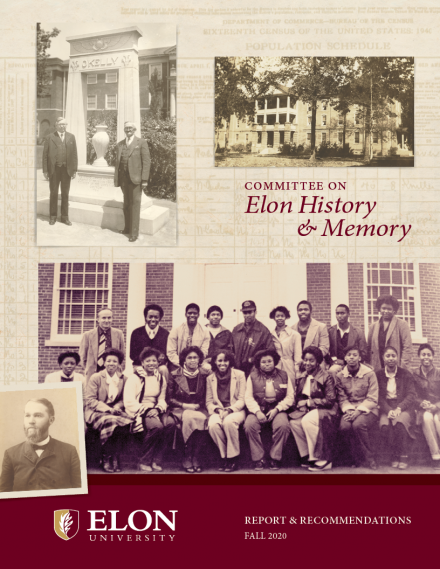The 52-page report includes 13 recommendations for action and 10 stories that explore difficult moments in Elon’s history.
The Committee on Elon History & Memory has released a detailed report that focuses on the experiences of Black members of the Elon community throughout its history and explores ways to improve policies and procedures regarding Elon’s commemorative practices going forward. The report is the result of two years of work by the 12-member committee formed in 2018 by President Connie Ledoux Book to examine the university’s history and how it has been told through the years.
The report details 10 episodes that illustrate both anti-Black racism and Black achievements that have been only partially told or erased. The issues depicted in the episodes range from a deeper look into the legacy of William A. Harper, Elon’s fourth president whose name was removed from a residential building over the summer due to racist behavior, to current efforts to diversify the curriculum.
“We hope the stories and the recommendations we present help make Elon a more just and inclusive place — and that they bring some measure of healing to people who have struggled to see themselves in the institution’s story,” the report states.
Among the 13 recommendations included in the report, which align with the university’s ongoing diversity, equity and inclusion initiatives, are establishing a permanent version of the Committee on Elon History and Memory; implementing a new process for the renaming of spaces on campus; developing new commemorative practices around a more inclusive version of Elon’s history, such as oral history projects and tours about the Black experience at Elon; and creating multiple pathways for students to confront race in their coursework. The report also calls for support of The Black Lumen Project, a new university effort evolving from Elon’s participation in Universities Studying Slavery.

The committee is the brainchild of three Elon history faculty members — Peter Felten, Charles Irons and Andrea Sinn. They first approached Elon President Leo M. Lambert with the proposal in August 2017 and the idea began to take shape. President Book picked up on the work when she took office in March 2018 and announced the formation of the committee at the opening of the 2018-19 academic year, calling on the group to “examine Elon University’s institutional history in a transparent, participatory and intellectually rigorous manner and to guarantee that we tell Elon’s story in a manner consistent with our values.” Then-Provost Steven House subsequently convened the Committee on Elon History and Memory to begin this work. He charged the committee “to engage the broader community in important conversations about our shared past; inspire those with relevant training and expertise to uncover hidden stories; advise those seeking to tell a more democratic and rigorous version of our history; and share more broadly the excellent work students, faculty and staff are already doing.”
President Book said having a full and honest understanding of the university’s past will provide critical new understanding about the present and allow the institution to speak to justice and equity with specific knowledge and examples. “This is critical and courageous work, and I am confident the university will be a stronger community as a result of these efforts,” she added.
While the committee set out to uncover new narratives related to race, labor, gender, sexuality, religious diversity and other aspects of the human experience, it decided to concentrate initial efforts on the Black experience at Elon since the bulk of current scholarship from other universities conducting similar work focuses on race. “Given the energy of the field and the fact that in the context of the history of the American South, race is the most salient aspect of differentiation and exploitation, it seemed appropriate to start with that,” said Charles Irons, William J. Story Sr. Professor of History and chair of the committee. “But we want to be emphatic that we know it’s not the only aspect of identity and we know there is additional work to be done.”
Randy Williams, vice president and associate provost for inclusive excellence, said much of this information has been out of sight. As it becomes more visible, he added, the Elon community will have to assess how this new information aligns with who we are as an institution, and how to respond when the information does not align with our mission and values. “It’s going to be hard, it’s going to be uncomfortable, it’s going to be a long haul, but we have to engage in it,” Williams said. “By understanding the history, we can understand how we got to where we are and how we might go into the future differently so we can create a truly inclusive environment, one where we’re getting closer and closer to humanity.”
Consistent with the committee’s resolve to focus first on race, Elon University formally affiliated with Universities Studying Slavery (USS) in February 2019. USS is an international consortium of roughly 70 colleges and universities that “allows participating institutions to work together as they address both historical and contemporary issues dealing with race and inequality in higher education and in university communities, as well as the complicated legacies of slavery in modern American society.”
Additionally, the committee convened a subcommittee to imagine what a permanent incarnation of USS might look like at Elon. That subcommittee evolved into The Black Lumen Project: An Equity Initiative, which aims to build on existing work related to the Black experience at Elon in collaboration with the Center for Race, Ethnicity and Diversity Education and African & African-American Studies.
For more information about the committee and to read the full report visit the committee’s website. Questions and feedback about the report can be send to elonhistory@elon.edu.


